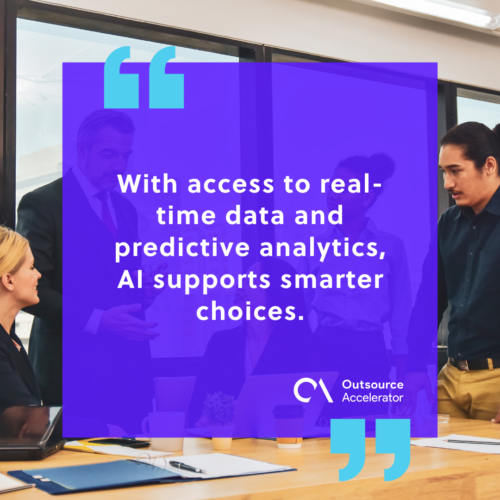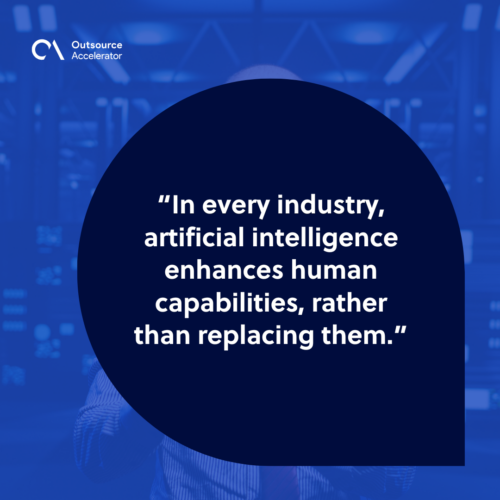Top 12 remote AI jobs in 2026

The rise of artificial intelligence is transforming remote work environments. AI-driven tools now manage tasks such as customer service and data entry, changing the types of skills employers value most.
According to the U.S. Bureau of Labor Statistics, AI-related jobs are expected to grow by 23% over the next decade, reflecting a strong and growing demand.
In this article, we’ll explore how the job market is evolving and highlight 12 in-demand remote AI roles for professionals looking to work from anywhere.
Advantages of incorporating AI into daily work
Artificial intelligence is becoming a valuable part of everyday work life. From automating routine tasks to offering smart insights, AI helps professionals work faster and make better decisions.
Here are the major advantages of using AI in daily tasks:
Saves time on repetitive tasks
AI tools can handle repetitive jobs like scheduling, data entry, and sorting emails. This frees up time for more important and creative work, allowing employees to focus on tasks that need human input.
Improves decision-making
With access to real-time data and predictive analytics, AI supports smarter choices. It highlights trends, suggests next steps, and reduces guesswork, especially in fast-moving industries like finance, marketing, and healthcare.

Boosts productivity
AI helps speed up workflows by organizing tasks, tracking progress, and suggesting more efficient ways to complete projects. Teams can achieve more in less time with fewer errors.
Enhances customer experience
AI-powered chatbots and virtual assistants respond to customer inquiries quickly and accurately. It leads to faster resolutions, higher satisfaction, and better support, without overwhelming customer service teams.
Supports learning and development
AI can recommend personalized training and resources based on an employee’s performance and goals. A targeted approach helps workers grow their skills while staying productive on the job.
Incorporating AI into daily work offers clear benefits across various roles and industries. As these tools continue to evolve, they will play an even greater role in helping professionals stay efficient, competitive, and forward-thinking.
How AI is used in different industries
Artificial intelligence is no longer limited to tech companies. It’s now a practical tool across a wide range of industries, helping businesses improve efficiency, cut costs, and deliver better results.
Let’s dive into how different sectors are using AI in everyday operations:
Healthcare
AI supports doctors by analyzing medical images and patient data quickly. However, human specialists interpret the findings, make final diagnoses, and tailor treatment plans to each patient.
This partnership improves accuracy while keeping care personal.
Retail
AI recommends products and manages inventory based on customer behavior and trends.
Retail professionals use these insights to plan marketing strategies, improve store layouts, and enhance customer engagement. Together, they create a seamless and personalized shopping experience.
Finance
AI tools scan transactions to detect fraud and assess credit risk. Financial experts review these alerts, investigate complex cases, and make decisions based on broader economic factors.
The combination of AI speed and human judgment creates a more secure and responsive system.
Manufacturing
AI monitors production lines, predicts equipment issues, and maintains quality control. Human technicians use these insights to perform targeted repairs, refine processes, and handle tasks that require hands-on expertise.
This teamwork reduces downtime and improves output.
Education
AI platforms customize lessons and track student performance. Teachers use this data to identify learning gaps, provide extra support, and adapt their teaching methods.
The blend of AI and human guidance creates a more personalized and effective learning environment.
Transportation
As for the transportation sector, AI optimizes routes and powers autonomous features. Human drivers and planners respond to unexpected events, manage logistics, and make real-time decisions in complex situations.
Their collaboration leads to safer, more efficient transportation systems.
In every industry, artificial intelligence enhances human capabilities, rather than replacing them. Together, they drive better results and unlock new possibilities.

12 Remote AI jobs dominating the job market
Below we have 12 remote AI jobs that are shaping the future of work:
1. AI engineer
An AI Engineer designs and builds AI models that help machines solve problems, automate tasks, and make decisions. Working remotely, they develop systems for natural language processing, computer vision, and robotics.
This role requires a strong foundation in programming, data science, and algorithm design. AI Engineers often collaborate with data scientists and product teams to integrate smart solutions into real-world applications across various industries, from healthcare to finance.
2. Machine learning engineer
Machine learning engineers create algorithms that allow systems to learn from data and improve over time. They handle tasks like training models, evaluating performance, and refining predictive capabilities.
As a high-value remote AI job, they often focus on deploying models into production and scaling them for real-world use. Proficiency in Python, TensorFlow, or PyTorch, along with a solid grasp of statistics and data modeling techniques, are must-haves for this role.
3. Data engineer
Data engineers build the infrastructure that powers AI systems. They design, maintain, and optimize data pipelines that gather, process, and store large datasets.
This remote AI job enables teams to access clean, structured data necessary for machine learning models and analytics.
Data engineers require expertise in SQL, data warehousing, cloud platforms, and big data tools like Spark or Hadoop.
4. AI consultant
AI Consultants help businesses adopt AI strategies that align with their goals. They assess existing processes, recommend AI tools, and guide implementation.
This remote AI job bridges technical teams and business stakeholders, translating needs into smart, scalable solutions. Strong communication skills, industry knowledge, and a background in AI technologies are key to this role.
5. AI artist engineer
AI artist engineers combine creativity with machine learning to generate digital art, music, or visual content. They use AI tools to design unique media, working remotely on projects for marketing, entertainment, or design firms.
It blends artistic vision with coding skills, requiring knowledge of generative AI models like GANs or diffusion-based systems.
6. AI prompt engineer
AI prompt engineers craft effective prompts to guide AI models in producing high-quality outputs. They test, refine, and optimize prompt structures for tasks like writing, coding, and image generation.
In addition, AI prompt engineers collaborate with developers and content teams to improve AI performance.
Further, this role requires strong communication skills, creativity, and a deep understanding of how large language models function.
7. AI researcher
AI researchers explore new techniques and advancements in artificial intelligence. They work on improving algorithms, creating innovative models, and publishing findings that push the field forward. They partner with universities, labs, or private firms remotely.
AI researchers possess advanced knowledge in mathematics, deep learning, and scientific methodology, along with strong programming and analytical skills.
8. AI content writer
An AI content writer creates and refines written material using AI tools, often generating blog posts, product descriptions, or marketing copy. They blend creativity with prompt engineering to produce engaging and relevant content.
AI content writers have strong writing skills, familiarity with language models, and the ability to guide AI-generated drafts into polished, brand-aligned pieces. They often collaborate with marketing teams to deliver high-volume, SEO-friendly content efficiently.
9. Generative AI and LLM Specialist
A Generative AI and Large Language Model (LLM) Specialist develops and fine-tunes advanced AI models for tasks like text generation, summarization, and translation.
They build solutions that leverage models such as GPT or Claude to enhance business operations or user experiences.
These specialists are backed by expertise in NLP, model training, and prompt optimization. They also evaluate ethical use and performance, ensuring the technology delivers high-quality results across various applications.
10. AI & data project manager
An AI & data project manager oversees the planning, execution, and delivery of AI and data-related projects. They coordinate between technical teams, stakeholders, and clients to meet project goals on time and within budget.
As project managers, they have strong organizational and communication skills, along with a good understanding of AI tools and data processes.
Their leadership keeps teams aligned and focused, making complex initiatives more manageable and results-driven.
11. Data science manager
A Data science manager leads remote teams of data scientists to develop models, analyze data, and drive strategic insights. They manage workloads, set priorities, and guide research toward business objectives.
This role requires experience in statistics, machine learning, and data visualization, as well as strong leadership skills.
Data science managers also collaborate across departments to transform complex data into actionable strategies, directly contributing to business growth and innovation.
12. AI development analyst
An AI development analyst supports the design and evaluation of AI systems by analyzing data trends, testing models, and tracking performance metrics.
They help identify improvements and guide development based on insights gathered from real-world usage.
An AI development analyst’s must-have skills include a mix of analytical thinking, programming skills, and familiarity with AI frameworks. Their work bridges technical development and business needs, helping teams deliver smarter, more efficient AI solutions.
The future of remote AI jobs appears promising, as demand continues to grow across various industries. With evolving technology and flexible work models, professionals can build impactful careers from anywhere in the world.







 Independent
Independent




